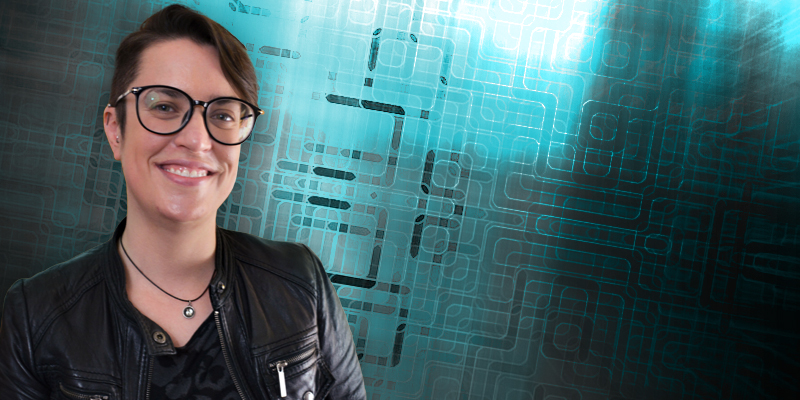Kelly Lagor: Putting the “Science” in Science Fiction

We’ve all been there. You’re sitting in a movie theater or reading on your couch, and out of a character’s mouth comes the most laughably awful science you have ever heard. At first, you might try to hang onto your suspension of disbelief. But it’s just groan-inducingly wrong. Why couldn’t the writer spend five minutes on the internet to get it right? Maybe you vow to never see anything by that creative team again. Maybe you put the book down and never pick it up again. Maybe you think this is why we’ve seen a rise in scientific conspiracy theories of late, like anti-vaxxers or climate change deniers, and how their ignorance is hurtling us towards a preventable destruction.
There’s a palpable sense nowadays that science is under attack. In this climate, with science fiction’s unique position among genres to instill scientific understanding and inspiration in its consumers, do writers have a responsibility to get the science right?
Endemic to the question of responsibility is first understanding what role science plays in a story. After all, if the science doesn’t need to be accurate, then the question of responsibility isn’t even the right question to be asking. I spoke with a number of writers and editors to explore the different perspectives on this topic.
There are roughly two major ways in which science is employed within a story. The first is how science plays a role in a story’s message. As short fiction writer Caroline Yoachim points out, “Some stories are meant to be extrapolations of current science, to show what the future might like look. Other stories examine the ethical implications of various scientific discoveries or types of technology.” Her distinction between ethical examinations and fanciful extrapolations also underscores the different effects these types of stories can have on its readers. Writer A.T. Greenblatt says of the former type, “When we imagine possibilities that we don’t have the science or engineering knowledge to make a reality yet, like intergalactic travel or synthetic brains, that’s the dreamstuff – the science fiction that will inspire the scientists and engineers.”
The second is how it is portrayed within the story itself. Writer Mary Robinette Kowal says, “I think that magic and science are interchangeable in stories, and that which you choose is a question of aesthetics rather than mechanics. In both cases, if they are a plot point, the reader needs to have a solid understanding of the rules. If they aren’t a plot point, then they help shape the tone of the story.” In this way, Kowal distinguishes between the literal and the metaphorical, and this pairing of the real and the unreal when combined can steep a story in both science and meaning. Asimov’s editor Sheila Williams puts it another way: “The science is what makes the stories sing. When you can use science so that a story is fun and looks at the human condition in interesting ways, and it’s an integral part of the story, I think those are the best stories in the world.”
These approaches don’t have to be mutually exclusive. You can have science permeate every aspect of a story, dealing with the ethical consequences of a future extrapolation, with science underlying both the story’s metaphor and mechanics. Both distinctions exist on a spectrum – from using science literally to metaphorically, in anything from an adventure to allegorical tale. Since science can play many different kinds of roles, then, does it even need to be accurate?
Tor.com Publishing editor Lee Harris says, “A good science fiction story takes our current understanding of what is possible with science and uses that understanding as the basis of the world that the author is creating. And the type of science is pretty much immaterial; the answer remains the same whether you’re dealing with physics, chemistry, time, or the social sciences; a good science fiction story does not contravene what we currently know about that specific area of science. Except when it must.”
Writer and co-editor of Escape Pod S.B. Divya touches on that “when it must” angle. “As an author, your responsibility is to tell a good story, not to do good science. That’s the responsibility of a scientist. If science inspires you to tell a story that speaks to people, bend the rules, go ahead. If we didn’t do that, we wouldn’t have time-travel stories or Star Wars. We wouldn’t have things that have inspired so many people.”
That “when it must” is the fudge area. That’s where we pull Greenblatt’s “dreamstuff” from, but that’s also where we get the groan-able bits, ranging from big red buttons that send us to plaid, to pills that let us use 100% of our brains. Writer Sarah Pinsker says, “I think it depends partly on whether the science currently exists. It’s harder to get people to suspend their disbelief if they have actual knowledge that contradicts whatever you put in the story.”
In this era of instant information gratification, you need to be thoughtful. Greenblatt says, “If all it takes is a Google search to research the science, that means your readers will have access to the same information and can fact check you.”
Fact check you they will. Williams says, “Some fudging can be fine for plot reasons, but a magazine can’t be as cavalier with facts because of our direct interaction with our readers. If the author puts the wrong tape recorder in a story set in the 1930s, we are going to hear from a Dean Emeritus of Electronics and Computer Technology. I’ve learned an awful lot in my career from my readers. I’ll never let an author get away with putting a space elevator in the wrong place again.”
Furthermore, writer Elizabeth Bear distinguishes between how different types of stories require different types of accuracy. “There’s a lot of fun to be had in reading a rigorous hard SF story where everything is super crunchy and functional and, in the case of those stories, the rigorousness itself serves as a marketing hook. That’s what the reader is coming to that particular story for. The limits of the physical universe itself can serve as an engine of conflict. But in another story, faster-than-light travel or time travel can serve as a mechanism for producing a particular conflict or illuminating a particular thematic argument, and it’s not relevant to the story’s purpose whether the ships travel at the speed of plot or not.”
Therefore, reader expectations appear to be the main driver of requirements for accuracy, and Harris outlines a good general approach. “Get the science as right as it can be in order to gain the trust of your readers for the science that you’re (as far as we know) inventing. Science is based on rules. And all rules can be broken. But you need to understand the rules before you break them, and you need to understand why you’re breaking them, or it just looks like you’re flailing. Get that wrong and the reader will be pulled out of the story, and not trust the rest of what the author says.”
That reader trust is everything. That’s what attention to detail instills, and regardless of the level of detail you’re including, those are the expectations you’re creating for your reader. You need to be consistent, because with reader trust comes writer responsibility. “Depending on the type of story you’re trying to tell,” Yoachim explains, “even a blatant disregard for science isn’t necessarily a problem. For me, the real responsibility science fiction writers have is to not get science wrong in ways that are harmful–e.g., suggesting that vaccines cause autism.” Kowal agrees. “I think that if they are presenting it as ‘real science,’ then there is a responsibility to get it right, because so many people learn their science from fiction.”
Writer Marissa Lingen explains how that responsibility extends to being mindful of contemporary scientific controversies. “There is definitely a responsibility to examine my speculative premises and make sure I’m not adding to any of the harm. Your stories exist in the world. So for me there’s a line, where if you want to make up portable wormholes that aliens use to travel, and it doesn’t actually fit what wormholes are, knock yourself out. But if you want to make up that climate change is a hoax, that’s not actually harmless; that’s pretty irresponsible.”
Writer Aliette de Bodard explains that this responsibility is part and parcel of fiction writing today. “We have the same responsibility we’ve always had. It’s not just how we portray the science, but also how we portray different cultures, ethnicities, different places, etc. I feel as an author I have a responsibility not to feed into problematicness. I feel a lot more strongly about, for instance, stories that promote the stereotype of the submissive Asian, because that pushes on something that exists. Similarly, that’s the reason why I would feel very uncomfortable writing an anti-vaxx story, because it already exists and for me it would be shoring it up.” Lingen agrees. “I feel like there is definitely a responsibility to examine my speculative premises and make sure I’m not adding to any of the harm.”
When done well, Williams explains reader trust can play into science fiction’s conversation with scientific advances: “SF is a great way for evangelizing for science, and for highlighting important issues. When it’s done so cavalierly wrong it just is not intellectually exciting for anyone, and a young person might think, ‘Wow this is all flashy,’ but it doesn’t give them a lifelong interest. You want to pull them in, make them curious, make them wonder.”
Well done science in science fiction also can serve to inoculate against the kind of fallacious thinking that leads to the science denialism we see today in climate change denial and anti-vax attitudes. Divya explains. “Kids today are growing up with all-pervasive technology, and I want both my child and her classmates to think about how they use these tools, in what ways the tools affect their lives, and what the plusses and minuses are, because there are always trade-offs. That’s a critical thinking skill, and we definitely need to educate our next generations to think critically about science and technology.”
Scientific accuracy does matter, and different authors approach that accuracy in different ways. However, if you don’t have a scientific background, how do you ensure you’re being both accurate and responsible? In the second part of this discussion, we’ll look at how different writers and editors approach the science in their fiction and the different methods one can employ in the name of accuracy.
Kelly Lagor is a scientist by day and science fiction writer by night. Her fiction and nonfiction have appeared in various places and she tweets and blogs about all kinds of nonsense @klagor and at <www.kellylagor.com>.
All opinions expressed by commentators are solely their own and do not reflect the opinions of Locus.
This article and more like it in the January 2020 issue of Locus.
 While you are here, please take a moment to support Locus with a one-time or recurring donation. We rely on reader donations to keep the magazine and site going, and would like to keep the site paywall free, but WE NEED YOUR FINANCIAL SUPPORT to continue quality coverage of the science fiction and fantasy field.
While you are here, please take a moment to support Locus with a one-time or recurring donation. We rely on reader donations to keep the magazine and site going, and would like to keep the site paywall free, but WE NEED YOUR FINANCIAL SUPPORT to continue quality coverage of the science fiction and fantasy field.









I am glad to see somebody talking about science in SF. 🙂
This is a long tradition going all the way to Kepler. A few more names from the top of my head: Fred Hoyle, David Brin, Catherine Asaro, Greg Egan, Gregory Benford (of the Benforad’s beacons), Paul McAuley. From Eastern Europe: Alexander Bogdanov and more recently Julie Novakova come to mind. Springer has a series of SF books written by scientist.
Almost all of the pleasure reading I get to do is SF. Those of us read SF regularly and know a bit more about science, or who are working scientists, are perhaps mostly easily pulled out of the story when the “current” science is inaccurate, or the speculative science too implausible. We appreciate the attention to detail and the efforts made to “get it right” – and the efforts of fellow scientists who write SF to act as peer reviewers of the literature… Great article, hope to see more like this.
Great Article. I’ve written about this same subject many times on my own site. For additional resources, writers should also check out the book “Putting the Science in Fiction.” Dan Koboldt is the editor, and many articles are free on his website, including a couple of mine. While I take some liberties in my own scifi writing, in general, I keep it as accurate as possible, not just to teach readers something, but to show them what’s possible and inspire them to make it a reality. Writing inaccuracies into the science would make that even harder and promises to disappoint and discourage your readers. You can still write great scifi without compromising the science. I feel that is my duty as a writer and scientist.